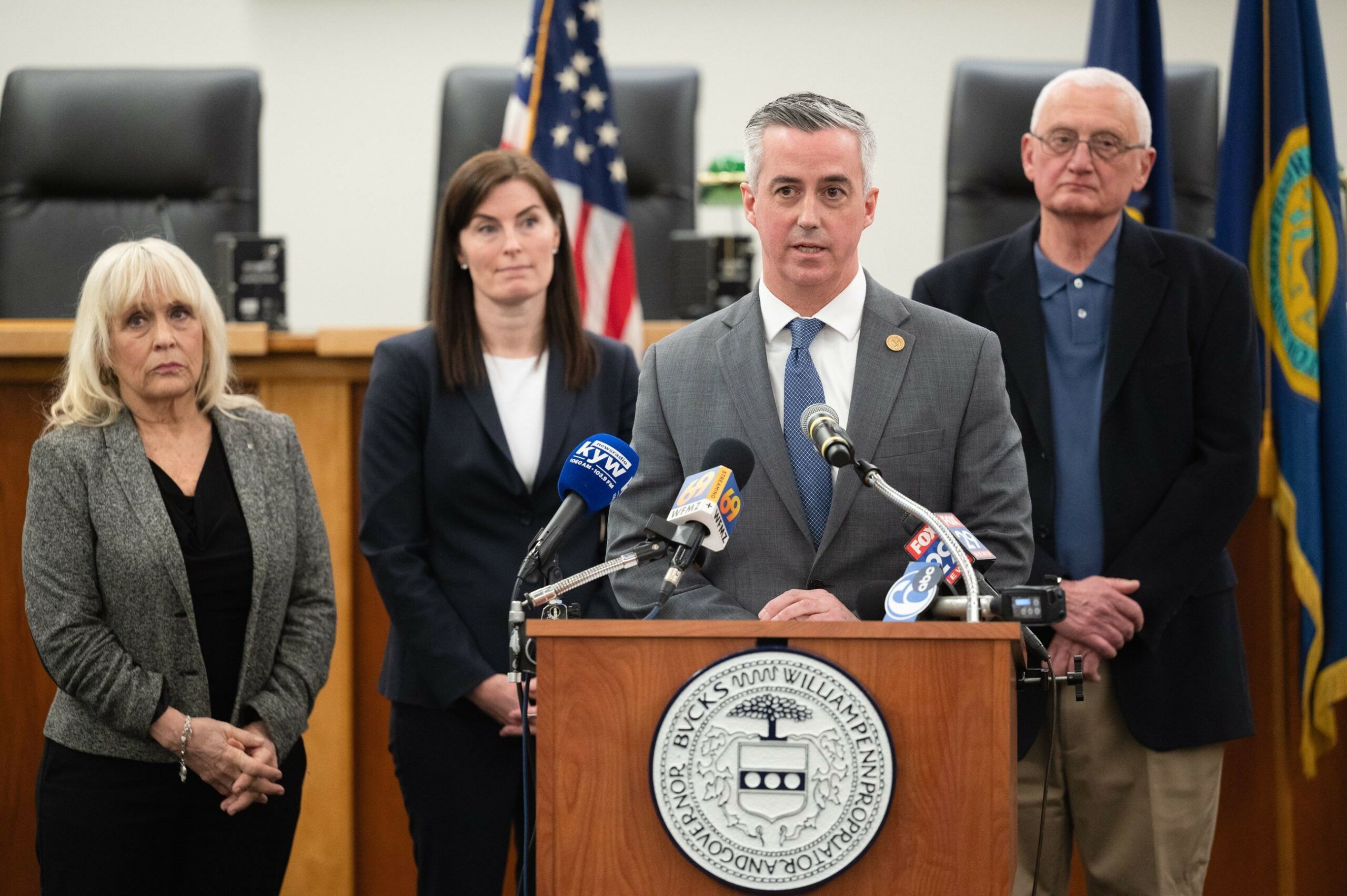The Bucks County commissioners announced Monday they are suing some of the world’s largest global oil producers over the local effects of climate change in Bensalem and Yardley.
The lawsuit, filed in Common Pleas Court against BP, Chevron, Conoco Phillips, Exxon Mobil, Shell, and the American Petroleum Institute, claims they knew their product was causing climate change and failed to warn the public. Bucks County argues that those companies should be held liable for the local impacts of warmer temperatures.
“In recent years, we have experienced unprecedented weather events here in Bucks County that have repeatedly put residents and first responders in harm’s way, damaged public and private property, and placed undue strain on our infrastructure,” said Commissioner Chair Diane Ellis-Marseglia (D). “We’re already seeing the human and financial tolls of climate change beginning to mount, and if the oil companies’ own data is to be believed, the trend will continue.”
Bucks County is “following the model established in suits (it) brought against PFAS manufacturers, social media giants, and opioid companies. This complaint seeks to shift the financial burden of the climate crisis from the taxpayers of Bucks County to the companies responsible for creating the crisis,” according to a statement from the county.
At least eight states and more than two dozen local governments have filed similar lawsuits.
Critics, like David N. Taylor, president and CEO of the Pennsylvania Manufacturers Association, have accused the county of political posturing that is unconnected to reality.
“Suing oil and gas companies for providing an essential product that not only enables modern life but drives significant economic growth in our state is nonsensical and will result in higher costs for manufacturers, businesses, and consumers alike,” Taylor said.
“It’s unfortunate Bucks County took the bait of a copy-and-paste-lawsuit pushed by out-of-state activists and billionaire hypocrites over the well-being of Pennsylvanians.”
But commissioners from both parties supported the lawsuit.
“These companies have known since at least the 1950s that their ways of doing business were having calamitous effects on our planet, and rather than change what they were doing or raise the alarm, they lied to all of us,” said Republican Commissioner Gene DiGirolamo. “The taxpayers should not have to foot the bill for these companies and their greed.”
“This suit is our tool to recoup costs and fund public works projects like bolstering or replacing bridges, retrofitting county-owned buildings, and commencing stormwater management projects, all of which will put us in the best possible position to weather what is certain to come,” Ellis-Marseglia added.
Can a company whose product is being used in every nation in the world be held responsible for alleged local consequences from impacts on global climate?
A Delaware judge took a dim view of that legal strategy and tossed out significant parts of a similar case. On Jan. 9, Delaware Superior Court Judge Mary Miller Johnston ruled the Clean Air Act preempts Delaware’s core allegations for public nuisance, trespass, and failure to warn since it sought damages for activity resulting from out-of-state or global greenhouse gas emissions. Delaware can only proceed with claims proving alleged injuries were the cause of emissions from sources within the state. Prevailing with that claim isn’t possible in this case. The judge found that in-state Delaware emissions cannot have a material effect on the global nature of climate change.
Energy companies argue addressing climate change and public policy is a job for the federal government, not local governments.
“Addressing climate change requires a coordinated international policy response, not meritless local litigation over lawful and essential energy production,” said Theodore J. Boutrous, Jr. of Gibson, Dunn and Crutcher, counsel for Chevron Corporation.
Others in the energy sector accused Bucks County of hypocrisy.
“Bucks County and its elected county officials have relied on oil and natural gas for decades to meet their transportation needs and to power their once-mighty steel industrial base,” said Curt Schroder, executive director of Pennsylvania Coalition for Civil Justice Reform. “Yet the commissioners have filed climate change litigation for a situation they helped cause. When can we expect all county-owned vehicles to be electric or all the county buildings to be powered by renewables?
“One would expect such actions to follow immediately upon the heels of the action taken by the county leaders. Pennsylvanians already pay a hefty ‘tort tax’ that goes right into the pockets of out-of-state trial lawyers, and this lawsuit will only raise costs even higher for hard-working people across the state – all without advancing real climate solutions. Lawsuits targeting the lawful production of energy are an abuse of our state’s civil justice system and an end-run around the democratic process,” Schroder added.
And both supporters and opponents of the legislation agree that a Bucks County lawsuit isn’t going to solve the problem of climate change.
“These local lawsuits do nothing to address our real energy challenges. In fact, lawsuits like this actually undercut Pennsylvania’s role in addressing climate change. Electric sector-related emissions have plummeted in recent years as more natural gas has come online to meet our growing power demands,” said Kurt Knaus, spokesman for the Pennsylvania Energy Infrastructure Alliance.
“That has led to cleaner air across our commonwealth. The United States is reducing greenhouse gas emissions faster than any other country in the world, an achievement tied to our emergence as the world’s top natural gas producer.
“The timing of this lawsuit has little to do with environmental concerns and everything to do with concerns over the coming election,” Knaus said.

